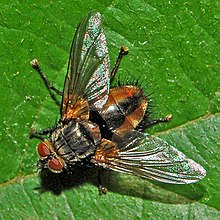Nemoraea pellucida
| Nemoraea pellucida | |
|---|---|

| |
| Nemoraea pellucida. Male | |
| Scientific classification | |
| Domain: | Eukaryota |
| Kingdom: | Animalia |
| Phylum: | Arthropoda |
| Class: | Insecta |
| Order: | Diptera |
| Family: | Tachinidae |
| Genus: | Nemoraea |
| Species: | N. pellucida
|
| Binomial name | |
| Nemoraea pellucida (Meigen, 1824)
| |
| Synonyms | |
|
List
| |
Nemoraea pellucida is a species of fly in the family Tachinidae.
Distribution
[edit]This species is present in most of Europe, in Russia, in Asia, in Japan and in North Africa.[1]
Description
[edit]Nemoraea pellucida can reach a length of 13.5–14.5 millimetres (0.53–0.57 in). These medium-sized flies have rather small head in respect of their body. In the males the thorax is grayish, with black lines. The scutellum is reddish and the abdomen is orange-yellow, with yellowish white pollinosity and a median black vitta. Legs are black. In a smaller form scutellum and abdomen are black. In the females the scutellum and the abdominal tergites arealways wholly black.[2][3][4][5][6]
Biology
[edit]Adults of these endoparasitoid flies can be found from March to May and in October-November.[7] They mainly feed on nectar of Angelica sylvestris.[8] The females lay their eggs close to the ovations of the host species, especially Hyphantria cunea, Orthosia cerasi, Dypterygia scabriuscula and Sphinx pinastri). When the larvae of the host are born, the larvae of these flies feed on the larvae of the host.[9][10]
References
[edit]- ^ Bisby F.A., Roskov Y.R., Orrell T.M., Nicolson D., Paglinawan L.E., Bailly N., Kirk P.M., Bourgoin T., Baillargeon G., Ouvrard D. Catalogue of life
- ^ Takeo Kocha On the Japanese Species of the Genus Nemoraea Robineau-Desvoidy, With Descriptions of Two New Species Entomologicat Institute, Faculty of Agriculture,
- ^ Chris Raper English Translation of The Tachinids (Diptera: Tachinidae) of Central Europe: Identification Keys for the Species and Data on Distribution
- ^ Chandler, Peter J. (1998). Checklists of Insects of the British Isles (New Series) Part 1: Diptera. Handbooks for the Identification of British Insects. Vol. 12. London: Royal Entomological Society of London. pp. 1–234. ISBN 0-901546-82-8.
- ^ Belshaw, Robert (1993). "Tachinid Flies Diptera Tachinidae". Royal Entomological Society Handbooks. 10 (4ai). Royal Entomological Society of London: 170.
- ^ van Emden, F.I. (1954). "Ditera Cyclorrhapha Calyptrata (I) Section (a) Tachinidae & Calliphoridae". Royal Entomological Society Handbooks. 10 (4a). Royal Entomological Society of London: 133.
- ^ iNaturalist
- ^ Waarneming
- ^ Vincenzo Vacante, Serge Kreite Handbook of Pest Management in Organic Farming
- ^ NBN Atlas
